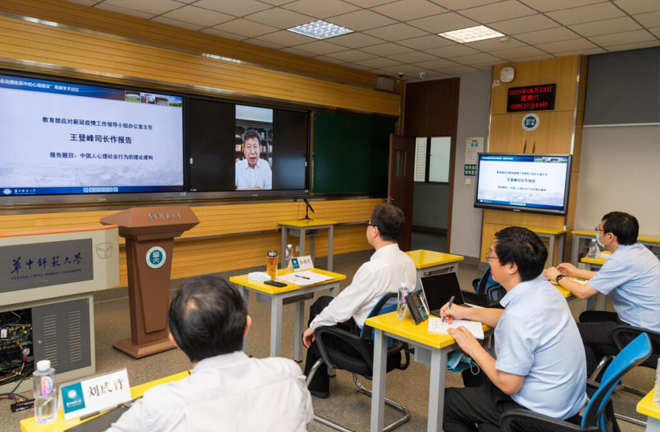Psychological services essential amid COVID-19, said experts

Scholars attend the webinar held on June 13 at the CCNU in Wuhan, Hubei Province. Photo: CCNU
Scholars discussed psychological services during the prevention and control of COVID-19 at a recent forum jointly held by the Central China Normal University (CCNU), the Chinese Social Psychological Association and the Chinese Psychological Society.
Hao Fanghua, president of Central China Normal University, said now that the prevention and control of the pandemic has normalized, it will take the effort of all sectors of society to enhance psychological construction, which is an important part of China’s social governance system. Psychological science can explain the mechanisms behind many social processes and social issues.
Zuo Bin, a professor from the School of Psychology at CCNU, said that to prevent and treat people’s “post-pandemic syndrome” in a systematic and scientific way, we should provide psychological services for everyone, enhance education through all media and all angles, and regain people’s trust, faith and confidence. As to the social groups that have been severely affected by the pandemic, we must help them adjust and recover through psychological rehabilitation. In addition, a community-based social mental health service system with Chinese characteristics must come into play, so that social mental health services can function in a timely, convenient and effective way.
Psychological services offered at the early stage of the pandemic mainly came from governments, universities and volunteers, comprising a service mode with Chinese characteristics. This process had integrated platforms, resources, professional help, which had delivered social effects. Internet and AI technologies were adopted during the process, said Zhou Zongkui, a professor from the School of Psychology at CCNU.
Zhou Xiaohong, a professor from the School of Social and Behavioral Sciences at Nanjing University, said that the relationship between individuals and groups lies at the center of contemporary values and social mentality building. Looking ahead, we need to nurture a social mentality that is compatible with the new era and pay closer attention to the instilment of values in the younger generations.
Wang Dengfeng, director of a leading COVID-19 response group of the Ministry of Education, said that we need to find out how to explain the psychology of Chinese people’s social behaviors in a conceptual system with Chinese characteristics. We need to produce social-psychological theories for the Chinese people by focusing on solving the problems of individuals, interpersonal relations, relationships between humanity and nature, and relationships between humanity and society.
At the forum, Zhou Zongkui also analyzed reports from the Ministry of Education on mental health hot lines and other national surveys. The reports outlined the changes of people’s psychological needs during the pandemic. Different groups of people in different places and at different times showed different attitudes, emotions and psychological needs. Zhou explained that the emotions and behaviors of the general public have gradually stabilized near the end of the pandemic, but mental health issues in focus groups have become more pronounced. During the pandemic, discrimination against certain groups of people and areas has also become prominent.
Hao said that CCNU has rapidly set up a hot line for psychological assistance during the outbreak, and it has answered 25,000 phone calls. The university has also provided articles, video programs, e-books and online open courses for the general public. Going forward, the university will further expand its platform for psychological assistance and strive to play a bigger role in the prevention and control of the pandemic and the socioeconomic development of China.
edited by WENG RONG

 PRINT
PRINT CLOSE
CLOSE